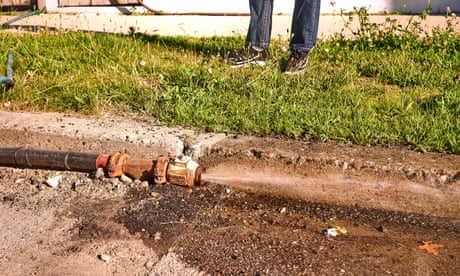- by foxnews
- 08 Apr 2025
Revealed: US cities refusing to replace toxic lead water pipes unless residents pay
Revealed: US cities refusing to replace toxic lead water pipes unless residents pay
- by theguardian
- 21 Jul 2022
- in news

But they skipped the tenement building where Bautista and her two kids lived.
They dug up pipes only at the homes of those who paid or took out loans for thousands of dollars, as well as under the public streets. Worse, the removal work risked causing a significant spike of toxic water for weeks, maybe months, in the homes of those unable to pay for it.
But according to a Guardian investigation, some US cities are now essentially telling residents: pay up for the replacement or get more poison in your water.
Studies have found that Black and brown children are far more likely to have elevated levels of lead in their blood and to live in older homes with lead lines, yet it tends to be wealthier white residents who take advantage of local programs that offer property owners loans to replace lead pipes.
In Washington Park, a mostly Latino working-class area of Providence with fruit stalls and Dominican bodegas, Bautista, 23, said she was outraged that many renters like herself and low-income homeowners missed out.
In the 19th century, pipes made of malleable and durable lead helped drive the explosive growth of American cities. Sentiments started to shift later in the century, as medical journals documented occasional epidemics of severe, waterborne lead poisoning, causing such symptoms as blue-lined gums, incapacitation and even death.
The US Centers for Disease Control and Prevention has said there are no safe levels of lead, which is now recognized as a neurotoxin that can cause lower IQ, developmental delays and behavioral problems in children, as well as kidney and cardiovascular problems in adults.
But there are still up to 12.8m houses and apartment buildings connected to the water system with lead lines in the US, according to the Natural Resources Defense Council.
The neighborhood, originally constructed for Italian, Irish and Portuguese migrant workers in the late 1800s, is now home to many Caribbean, African and Latin American communities. At nearby Roger Williams Park a bust of Juan Pablo Duarte, a founding father of the Dominican Republic, stands near both a US and a Dominican flag.
Ahead of the construction work, the city urged customers to pay to replace the portion of the lines located on their private property. It offered to cap the cost at $4,500 and to provide residents a zero-interest loan, which they could re-pay at $37.50 a month for the next 10 years. It warned that not doing so put them at risk of exposure to more lead.
Indeed, only 13 of the 263 property owners in Washington Park who were identified as having lead service lines last year signed up to receive a loan, according to public records obtained by the Guardian. In the end, 250 homes were left with lead pipes still connecting their buildings to the water system.
Ironically, in many cases, it was city codes that mandated lead in the first place, said Erik Olson of the NRDC.
A number of states, including Michigan, Illinois, and New Jersey, have banned partial replacements. Yet a ban does not necessarily mean an end to lead. In Chicago, for instance, working-class residents who make above the low-income line are asked to take out loans to foot the costs. The price tag for a pipe fix there: $15,000 to $26,000.
Providence Water says it hopes to correct the situation going forward.
Meanwhile the water department is testing a program that will try to level the playing field for future fixes, so low-income residents can get the work done without taking on loans.
This spring, Providence Water offered grants for free replacements to residents in another 40-block section of Washington Park. So far, based on water department records seen by the Guardian, fewer than half of the nearly 700 property owners in the area with suspected lead lines have given permission for the water department to replace the pipes on their property. The department is doing outreach to get more signups.
This dovetails with federal efforts. In March, the EPA clarified that cities will not be able to use the $15bn of new infrastructure funds to do partial pipe replacements. But activists worry that cities can still use other funding sources to do these partials, and can still run programs asking homeowners to take out loans.
Monica Huertas, a homeowner in this section of the neighborhood, already has one child of her four with high levels of lead in his blood, and she worries about whether it will cause learning difficulties. The city suspects she has lead pipes.
For now, Huertas says she buys bottled water and is teaching her children never to drink from the faucets.
Eric Lutz contributed to this story.
- by foxnews
- descember 09, 2016
Ancient settlement reveals remains of 1,800-year-old dog, baffling experts: 'Preserved quite well'
Archaeologists have recently unearthed the remarkably well-preserved remains of a dog from ancient Rome, shedding light on the widespread practice of ritual sacrifice in antiquity.
read more


